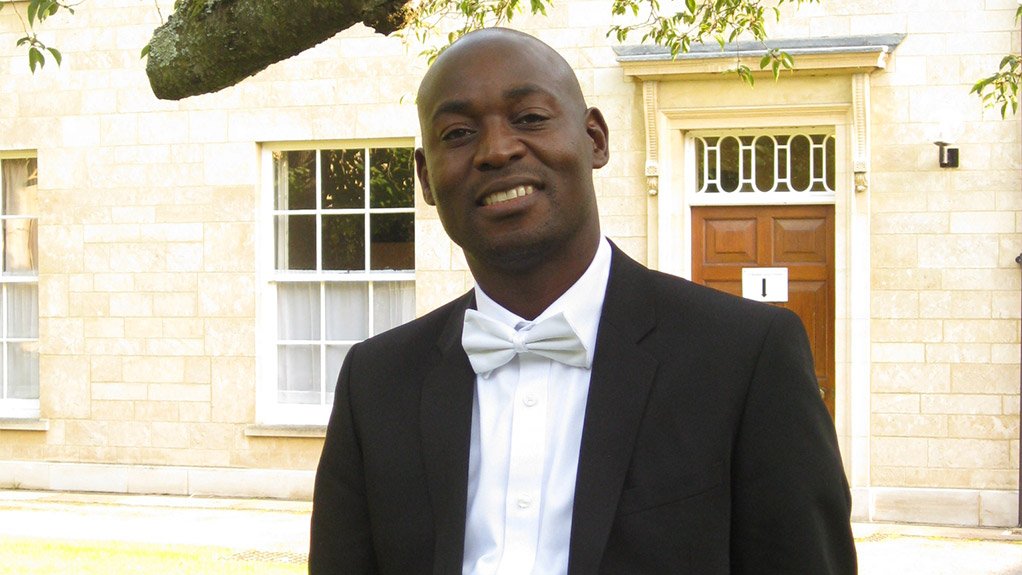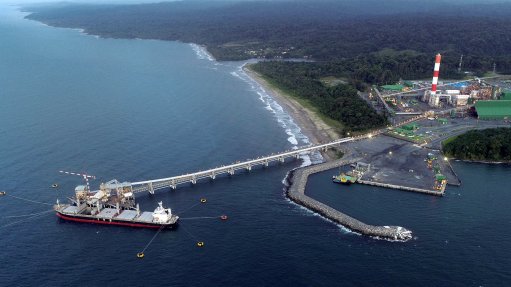SA mining sociologist scoops outstanding paper award


SIZWE PHAKATHI The informal work practice of making a plan (planisa) can be harnesses for safety and productivity
South Africa Chamber of Mines (CoM) deputy head of safety and sustainable development Dr Sizwe Phakathi’s PhD research paper, titled ‘Getting on and getting by underground: Gold miners’ informal working practice of making a plan (planisa)’, was selected by the Journal of Organizational Ethnography as the outstanding paper of 2013, last month.
The research paper, which was published in Volume 2, Issue 2 of the journal last year, is an ethnographic workplace study of underground gold mineworkers’ experience of working underground and their responses to organisational dysfunctions and management inefficiencies at deep-level gold mines.
The most critical finding of the research was that production crews make a plan or engage in planisa – a pidgin expression that describes how mineworkers have to deploy their skills and ingenuity to tackle the daily problems posed by the endemic uncertainties and organisational dysfunctions of mining – to offset production bottlenecks.
Unlike in an environment in which the worker has to perform according to more prescriptive guidelines, where the scope for the degree of control is much larger, workers in the deep-level mining environment face harsh mining conditions and bottlenecks that impinge on the daily running of the production process.
Therefore, production crews learn not only to deal with the complex uncertainties of their work environment but also how to work safely to survive, while responding to production demands by making a plan or improvising the production process, be it as a result of an instruction or the work team initiating action.
The informal work strategy of engaging in planisa reveals that formal or standardised methods of work organisation are not necessarily more efficient at achieving certain goals than other methods of work organisation, says Phakathi.
“Although production crews chiefly make a plan to get the job done, they cannot get it done without having first made the workplace safe. The research has discovered that, owing to organisational constraints and managerial inefficiencies, such as material shortages, underground mineworkers steal or borrow resources from other production crews, such as timber packs or props, not only to produce but primarily to ensure safety in the stope.
Mineworkers thus “get on and get by” to cope with these organisational and managerial constraints and inefficiencies. Making a plan is therefore a response aimed at improvising safety and productivity at the rock face,” notes Phakathi.
He explains that the choice of topic was informed by his previous research in the South African mining industry as a research intern at the University of the Witwatersrand’s Sociology of Work Programme, where he was involved in the DeepMine, FutureMine and CoalTech 2020 collaborative research projects, conducted under the auspices of the Council for Scientific and Industrial Research of South Africa.
“My interactions and conversations with mineworkers during this research revealed that engaging in planisa was very much a part of the production process at the rock face,” says Phakathi.
Phakathi is confident that his research and position at the CoM are making a significant contribution in ensuring safer and healthier workplace conditions in the mining industry.
Being a mining sociologist is a significant boon for the CoM, as Phakathi is well versed in issues regarding cultural change and change management in organisations and their impact on workplace safety and productivity.
Through his research, he gained insight into organisational, managerial, human, social and cultural factors influencing safety and productivity in mining operations.
Phakathi’s work at the chamber entails coordinating and facilitating the implementation of the five prioritised pillars of the culture transformation framework (CTF) for the South African mining industry and working with tripartite stakeholders to ensure safer and healthier workplace conditions for the industry.
The five prioritised CTF pillars are leadership, risk management, production bonuses and performance incentives, the effective adoption and implementation of leading practices in health and safety, and the elimination of race and gender discrimination.
“Since 2012, mining companies have been progressing the implementation of the various minimum standards of the five pillars. The progress made by mining companies in the CTF implementation has been reflected in the improvement of industry’s safety performance,” says Phakathi.
“I aim to make a significant contribution to the attainment of the mining industry’s goal of zero harm, whereby every mineworker returns home unharmed every day. I dedicate every effort I put into my work to the creation of a safer and productive working environment in the mining industry, so that my work at the chamber assists mining companies in effectively implementing the CTF, as envisioned in the Mining Charter.”
Phakathi is writing a book, based on his PhD research, on the impact of informal work practices, organisational culture and human factors on safe production in the South African mining industry.
Comments
Press Office
Announcements
What's On
Subscribe to improve your user experience...
Option 1 (equivalent of R125 a month):
Receive a weekly copy of Creamer Media's Engineering News & Mining Weekly magazine
(print copy for those in South Africa and e-magazine for those outside of South Africa)
Receive daily email newsletters
Access to full search results
Access archive of magazine back copies
Access to Projects in Progress
Access to ONE Research Report of your choice in PDF format
Option 2 (equivalent of R375 a month):
All benefits from Option 1
PLUS
Access to Creamer Media's Research Channel Africa for ALL Research Reports, in PDF format, on various industrial and mining sectors
including Electricity; Water; Energy Transition; Hydrogen; Roads, Rail and Ports; Coal; Gold; Platinum; Battery Metals; etc.
Already a subscriber?
Forgotten your password?
Receive weekly copy of Creamer Media's Engineering News & Mining Weekly magazine (print copy for those in South Africa and e-magazine for those outside of South Africa)
➕
Recieve daily email newsletters
➕
Access to full search results
➕
Access archive of magazine back copies
➕
Access to Projects in Progress
➕
Access to ONE Research Report of your choice in PDF format
RESEARCH CHANNEL AFRICA
R4500 (equivalent of R375 a month)
SUBSCRIBEAll benefits from Option 1
➕
Access to Creamer Media's Research Channel Africa for ALL Research Reports on various industrial and mining sectors, in PDF format, including on:
Electricity
➕
Water
➕
Energy Transition
➕
Hydrogen
➕
Roads, Rail and Ports
➕
Coal
➕
Gold
➕
Platinum
➕
Battery Metals
➕
etc.
Receive all benefits from Option 1 or Option 2 delivered to numerous people at your company
➕
Multiple User names and Passwords for simultaneous log-ins
➕
Intranet integration access to all in your organisation



















